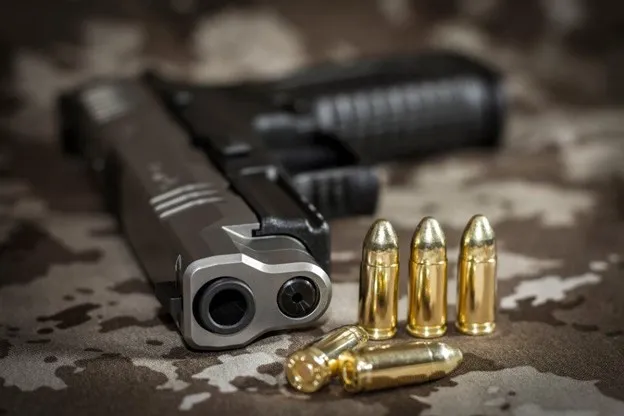Denver Weapon Crime: Public Safety Innovations

Denver has taken a proactive approach to addressing weapon crime and enhancing public safety through a variety of innovative measures. These include the deployment of advanced surveillance systems to monitor high-crime areas and discourage criminal activity. Furthermore, the city has implemented community policing initiatives aimed at cultivating stronger relationships between law enforcement and the local community, promoting collaboration and trust-building.
Denver has also fostered collaborative intelligence networks, utilizing technology and data analysis to identify patterns and prevent crime before it occurs. Technology-assisted crime prevention strategies are being employed to detect and track illegal weapons, enhancing law enforcement’s ability to respond swiftly and effectively.
Moreover, Denver has implemented gun violence intervention programs to offer assistance and resources to individuals who may be at risk of participating in weapon-related offenses. These efforts are reinforced by public awareness campaigns with the objective of educating the community about the repercussions of weapon-related crimes and encouraging responsible gun ownership. In sum, Denver’s innovative approaches to public safety underscore its dedication to establishing a safer environment for both its residents and visitors.
Enhanced Surveillance Systems
The implementation of enhanced surveillance systems in Denver has markedly improved law enforcement’s ability to monitor and tackle weapon-related crimes. These advanced systems, equipped with high-quality cameras, provide law enforcement officials with a wider and more detailed view of public spaces, which is crucial in identifying and responding promptly to incidents involving weapons, including those leading to violent crime and gun-related injuries.
Strategically positioned in areas known for higher crime rates or a propensity for weapon-related offenses, these surveillance cameras capture crucial footage. This footage becomes invaluable in criminal investigations, aiding in suspect identification, tracking movements, and piecing together the sequence of events leading up to a crime. This is particularly beneficial in cases of domestic violence, where evidence from surveillance systems can be critical in legal proceedings.
The real-time monitoring capabilities of these systems enable law enforcement officials to take proactive measures, potentially preventing crimes before they occur. This swift response not only protects the public but also serves as a deterrent to potential offenders. The effectiveness of these systems in Denver reflects a trend observed in numerous cities across the United States, where technology plays an increasingly significant role in improving public safety and assisting law enforcement initiatives.
Through these enhanced surveillance systems, law enforcement in Denver has gained a significant advantage in its efforts to combat weapon-related crimes, contributing to the overall safety and security of the community.

Community Policing Initiatives
Community policing initiatives have become a fundamental component of Denver’s approach to addressing weapon-related crimes. These initiatives prioritize the establishment of a collaborative relationship between law enforcement agencies and the community they serve. The objective is not only to prevent crime but also to improve public safety, build trust, and promote cooperation. The Denver Police Department has embraced various community policing strategies to enhance its effectiveness in addressing challenges like illegal firearm possession, gang activity, and firearm-related violence.
One aspect of these initiatives includes the formation of specialized units. These units work closely with community members, identifying and tackling factors contributing to weapon-related crimes. They focus on areas such as mental illness, which can sometimes be linked to firearm-related violence, and strive to implement effective interventions.
Moreover, the department has initiated various community outreach programs. Neighborhood watch groups and community forums are just a couple of examples. These programs aim to engage residents in crime prevention efforts actively. They also provide education on responsible gun ownership and information on topics like Suicide Prevention, which is often linked to gun-related incidents. Resources and insights from publications like the Economic Journal can also be incorporated to understand and address the economic factors associated with crime rates.
Through these community policing initiatives, Denver has made significant strides in creating a safer environment. By reducing weapon-related crimes and promoting responsible gun ownership, the city is working towards a community where safety and cooperation are paramount.
Collaborative Intelligence Networks
Implementing collaborative intelligence networks has been instrumental in addressing weapon-related crimes in Denver. These networks, comprised of law enforcement agencies, public safety organizations, and community stakeholders, work together to gather and analyze data on weapon crimes and share information in real-time. By pooling their resources and expertise, these networks can identify patterns, trends, and potential threats, allowing for more effective prevention and intervention strategies.
Through the use of advanced technology and information sharing platforms, law enforcement agencies are able to quickly access and disseminate critical information, enabling them to respond swiftly to incidents involving weapons. Additionally, collaborative intelligence networks foster trust and cooperation between different agencies and community members, leading to improved communication and coordination in the fight against weapon-related crimes. This multi-faceted approach has proven to be successful in reducing weapon-related crimes and enhancing public safety in Denver.
Technology-Assisted Crime Prevention
Technology-assisted crime prevention encompasses various tools and strategies aimed at enhancing public safety. Two key components of this approach are surveillance camera effectiveness and predictive policing software. Surveillance cameras have proven to be valuable in deterring crime and assisting law enforcement in identifying and apprehending offenders. Additionally, predictive policing software utilizes data analysis and algorithms to identify high-risk areas and individuals, allowing law enforcement to allocate resources more effectively and prevent crime before it occurs.
Surveillance Camera Effectiveness
The effectiveness of surveillance cameras in preventing crime has been a significant focus in Denver’s efforts to enhance public safety. These cameras serve as an essential tool in deterring criminal activities and aiding in the apprehension of offenders. Here are some key reasons why surveillance cameras have proven to be effective in crime prevention:
- Deterrent: The presence of visible cameras acts as a deterrent, discouraging potential criminals from committing offenses.
- Evidence Collection: Surveillance footage provides valuable evidence that can be used in investigations and prosecutions, aiding law enforcement in identifying and apprehending criminals.
- Real-Time Monitoring: Surveillance cameras allow for real-time monitoring of public spaces, enabling authorities to respond promptly to incidents and prevent crimes from escalating.
- Public Awareness: The knowledge that surveillance cameras are in place fosters a sense of public awareness and promotes responsible behavior, further reducing the likelihood of criminal activity.
Predictive Policing Software
Predictive policing software has emerged as a valuable tool in Denver’s ongoing efforts to enhance public safety and combat weapon crime. This technology-assisted crime prevention method utilizes advanced algorithms and data analysis to identify high-risk areas and individuals, allowing law enforcement agencies to allocate their resources more effectively. By analyzing historical crime data, demographic information, and other relevant factors, the software can generate predictions about where and when weapon-related crimes are likely to occur.
This enables law enforcement to proactively patrol these areas, intervene, and prevent potential incidents. Additionally, predictive policing software can help identify patterns and trends in weapon crime, allowing for targeted investigations and the identification of potential suspects. The implementation of this technology in Denver has shown promise in reducing weapon crime rates and improving overall public safety.
Gun Violence Intervention Programs
Gun violence intervention programs play a critical role in addressing the issue of weapon crime in Denver. These programs aim to prevent and reduce gun violence by targeting individuals at the highest risk of involvement in such crimes. Here are some key aspects of gun violence intervention programs:
- Community Outreach: Engaging with the community to build trust, raise awareness, and provide resources for conflict resolution and de-escalation.
- Crisis Intervention: Offering immediate support and assistance to individuals who are at risk of causing harm to themselves or others.
- Mentorship and Counseling: Providing guidance and counseling services to individuals involved in gun violence, promoting positive behavior change and alternatives to violence.
- Coordination with Law Enforcement: Collaborating with law enforcement agencies to identify and prioritize individuals who pose a significant risk and ensuring swift and appropriate intervention.
Public Awareness Campaigns
How can public awareness initiatives aid in decreasing weapon-related crimes in Denver? Public awareness efforts have the potential to be instrumental in reducing weapon crime in Denver by enlightening the community about the repercussions of unlawful weapon possession and advocating responsible firearm ownership. These initiatives can effectively convey the hazards linked with weapon-related offenses, motivating individuals to exercise informed judgment and dissuade them from participating in unlawful actions.
Moreover, through the dissemination of knowledge regarding secure storage practices, avenues for reporting, and accessible resources, these initiatives can empower community members to proactively engage in the prevention of weapon-related crimes. Additionally, public awareness campaigns have the potential to destigmatize seeking assistance for mental health concerns and motivate individuals to report suspicious activities. In doing so, they contribute to the overarching goal of fostering a safer environment for all residents of Denver.
Conclusion
Denver has implemented various public safety innovations to combat weapon crimes. These include enhanced surveillance systems, community policing initiatives, collaborative intelligence networks, technology-assisted crime prevention, gun violence intervention programs, and public awareness campaigns. These strategies aim to enhance public safety, reduce weapon crimes, and create a safer environment for the community. Through these efforts, Denver has taken significant steps towards addressing weapon crimes and ensuring the well-being of its residents.
